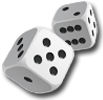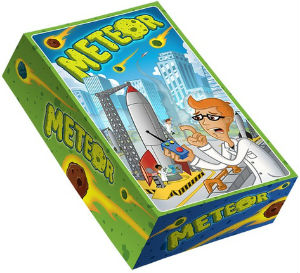



play board games
Board game reviews, strategy tips & session reports
Meteor Card Game Review
 Stats:
Stats:
No. of players: 1-5
Amount of time to play: about 5 min
Age requirements: 13+
Set-up time: minimal
Meteor is a fast-paced, real-time, cooperative card game. You must manage your hand to blow up meteors and save earth, but hurry you only have 5 minutes!
Meteor Rules Description:
You start Meteor with a hand of cards (the exact number is based on the number of players). There is a field of meteors the number of them is also based on the number of players. You also have five one-minute sand timers ready to flip. Every time a timer is out you flip the next one. After the last sand timer has run out if there any meteors still on the table, you lose. If at any point you destroy all the meteors, you win.
The cards in your hand are rockets, energy or research stations. Rockets have a value from 1 to 5 and require different energy to launch. You may build one rocket at a time. You can start by building the energy first or the rocket. And once started another player can help you build. Research stations cost energy to build and give you benefits.
After you have the required energy and rocket you may launch it at a meteor. You may launch the finished rocket whenever you are ready. Once hit with a rocket you flip the meteor over. In order to destroy a meteor, the value of your rocket (or rockets) must be equal to or greater than the value of the revealed meteor. The meteor card backs show a range of 1 to 3 or 3 to 5. So you have a general idea of what you need to hit them with. Hitting a small meteor with a high valued rocket is overkill and has consequences. Any time you overkill you place the current timer on its side and flip the next one over. You can always overkill the last meteor.
Whenever you flip a new timer you gain a certain number of cards from the deck depending on the number of players. You even get these cards as the result of overkill.
The other way to get more cards is to retrofit. A successful retrofit consists of four rockets of the same value, four rockets with completely different values, four of the same energy or a set of the four different energy cards. When you retrofit you gain five cards. They are distributed differently depending on the number of players.
The catch is you are not allowed to talk to the other players, but for the first game I suggest you allow this. There is also a research station that lets you talk to the other players.
There are also meteors with special abilities and specific vulnerabilities or some you can add that require more than one rocket to destroy. You can also add challenges or power cards to increase or decrease the difficulty or both for an advanced variant.
Quick Review of Meteor:
Meteor is exactly the type of cooperative game I enjoy playing. It goes quick, is real-time and is easy to teach and learn. It can be chaotic but it will not take more than five minutes and satisfying to win and keep ramping up the difficulty.
The components for this game are very nice. The card are durable the art is good and the rulebook is easy to read and follow.
I like how you can play this game with a group of new players and layer on each level of new rules and things to learn. It makes it very easy to teach and even the beginner games are enjoyable.
This game is very accessible to kids and non-gamers. And between how easy it is to teach and how fast it plays, you can pull it out and play with most anyone, anytime.
My only complaint is that compared to most cooperative games Meteor is a bit easy to win. That is less of an issue once you start playing with the boss meteors, or only using challenges and not powers.
If you are looking for a cooperative game you can play gamers and non-gamers can enjoy that plays super fast, you should pick up Meteor.
Score and synopsis: (Click here for an explanation of these review categories.)
Strategy 3 out of 6
Luck 4 out of 6
Player Interaction 4 out of 6
Replay Value 5 out of 6
Complexity 4 out of 6
Fun 5 out of 6
Overall 5 out of 6

Leave a Reply